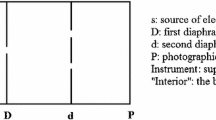Abstract
In a previous essay we demonstrated that quantum mechanical formalism is incompatible with some necessary principles of the mechanism conception still dominant in the physicist’s community. In this paper we show, based on recent empirical evidence in quantum physics, the inevitability of abandoning the old mechanism conception and to construct a new one in which physical reality is seen as a representation which refers to relations established through operations made by us in a world that we are determining. This change is profound and radical, with immediate consequences on both Ontology and Epistemology. This work is our contribution to try to make more concrete how this new conception of the world might be.





Similar content being viewed by others
Notes
Cohen-Tannoudji et al. (1977), is a good reference. We have to suppose that the reader knows the theory.
Alternative interpretations may not require an irreducible statistical character, as Bohmian Mechanics, for example. The discussion about the pros and cons of the different interpretations are beyond the scope of this essay.
Not all the interpretations of QMF introduce the collapse of the wave packet as a necessary postulate. For example, Everett’s relative state interpretation does not require collapse.
In the paper we are referring to (Megidish et al. 2013), they did it determining by tomography the density matrix of particles 1 and 4 and demonstrating afterwards that the measured matrices satisfied five different criteria of entanglement (fidelity, concurrence, Peres criterion, steering parameter and the violation of a Bell type inequality).
Prof. A. Zeilinger suggested to one of us (MF) that the case of the ether could be a counterexample to our conception of the truth. A look at the history of physics shows that is not really a counterexample. In fact, at the end of the XIX century, the scientific community was “sociologically” convinced of its necessity (Cordero 2011); only the indispensable confluences were missing, which led to its abandonment. Lack of space prevents us from delving into this discussion.
We thank Prof. A. Cordero for calling our attention to the relevance of the consilience concept.
References
Barnes, B., Bloor, D., & Henry, J. (1996). Scientific knowledge. A sociological analysis. London: Athlone.
Bell, J. (1987). Speakable and unspeakable in quantum mechanics. Cambridge: Cambridge University Press.
Cohen-Tannoudji, C., Diu, B., & Laloë, F. (1977). Mécanique quantique. Paris: Hermann.
Cordero, A. (2011). Scientific realism and the divide et impera strategy: the ether saga revisited. Philosophy of Science, 78, 1120–1130.
Cropper, W. (1970). The quantum physicists. London: Oxford University Press.
Deutsch, D. (1986). In Davies, P., Brown, J., (Eds.), The ghost in the atom. Cambridge University Press, pp. 91–93.
Dirac, P. (1947). The principles of quantum mechanics (3rd ed.). Oxford: Clarendon.
Einstein, A., Podolsky, B., & Rosen, N. (1935). Can quantum mechanical description of physical reality be considered complete? Physical Review, 47, 777.
Einstein, A. (1971). The Born-Einstein letters (pp. 170–171). New York: Macmillan.
Ferrero, M. (2003). Readers elaborate on fashion and truth, fact and theory. Physics Today, 56(12), 13–14.
Ferrero, M. (2004). Is the epistemic view of quantum mechanics incomplete? Foundations of Physics, 34(12), 1993–2003. doi:10.1007/s10701-004-1632-3.
Ferrero, M., Gómez Pin, V., Salgado, D., & Sánchez-Gómez, J. L. (2013). A further review of the incompatibility between classical principles and quantum postulates. Foundations of Science, 18(1), 125–138. doi:10.1007/s10699-012-9290-y.
Ferrero, M., Gómez Pin, V., & Sánchez-Gómez, J. L. (2014). The relevance of the preparation concept for the interpretation of quantum formalism. Epistemologia. An Italian Journal for the Philosophy of Science. Franco Angeli Edizioni.
Frazer, J. G. (1922). The golden bough. New York: Dover.
Kemble, E. C. (1951). Reality, measurement, and the state of the system in quantum mechanics. Philosophy of Science, 18, 273–299.
London, F., & Bauer, E. (1939). La Théorie de l’observation en mechanique quantique. Paris: Hermann.
Ma, X., Zotter, S., Kofler, J., Ursin, R., Jennewein, T., Brukner, C., et al. (2012). Experimental delayed-choice entanglement swapping. Nature Physics, 8, 480.
Megidish, E., Halevy, A., Shacham, T., Dvir, T., Dovrat, L., & Eisenberg, H. S. (2013). Entanglement swapping between photons that have never coexisted. Physical Review Letters, 110, 210403.
Mittelstaedt, P. (1998). The interpretation of quantum mechanics and the measurement process. Cambridge: Cambridge University Press.
Peierls, R. (1991). More surprises in theoretical physics. Princeton: Princeton University Press.
Peres, A. (2000). Delayed choice for entanglement swapping. Journal of Modern Optics, 47, 531.
Popper, K. (1968). The logic of scientific discovery. London: Hutchinson. (Original in German, 1934).
Quine, W. V. (1980). From a logical point of view: Nine logico-philosophical essays (2nd ed.). Cambridge, MA: Harvard University Press.
Rorty, R. (1999). Philosophy and social hope. Harmondsworth: Penguin Books.
Smolin, L. (2007). The trouble with physics. Boston: Mariner Books.
von Neumann, J. (1955). Mathematical foundations of quantum mechanics. Princeton: Princeton University Press. (German original 1932).
Weizsäcker, C. F. von (1971). The copenhagen interpretation. In Bastin, T. (Ed.), Quantum theory and beyond. Cambridge University Press, p. 26.
Wheeler, J. A., & Zurek, W. (1983). Quantum theory and measurement. Princeton: Princeton University Press.
Wheeler, J. A. (1996). At home in the universe. New York: Springer.
Whewell, W. (1847). The philosophy of the inductive sciences. London: J. W. Parker.
Wigner, E. (1967). Symmetries and reflections: Scientific essays. Bloomington: Indiana University Press.
Wigner, E. (1971). The subject of our discussions. In D’Espagnat, B. (Eds.) Foundations of quantum mechanics. Academic, New York.
Wolfe, H. C. (1936). Quantum mechanics and physical reality. Physical Review, 49, 274.
Author information
Authors and Affiliations
Corresponding author
Rights and permissions
About this article
Cite this article
Ferrero, M., Sánchez-Gómez, J.L. Coming From Material Reality. Found Sci 20, 199–212 (2015). https://doi.org/10.1007/s10699-014-9362-2
Published:
Issue Date:
DOI: https://doi.org/10.1007/s10699-014-9362-2




